Try our new free GreenChoice - Food Scanner mobile app!
DOWNLOAD-
-
-
Diets
Allergies
Take our 30-second quiz & we’ll filter our site to show only products that match your dietary preferences.
- GCNow
- Is Organic Juice Healthy? Plus the 10 Best Organic Juices
Is Organic Juice Healthy? Plus the 10 Best Organic Juices
Authors: Sydney Wexler and Makayla Meixner, MS, RDNPublished: February 11, 2022

 The best organic juice brands
The best organic juice brands
 Is organic juice good for you?
Is organic juice good for you?
 How to choose an organic juice
How to choose an organic juice
 Key takeaways
Key takeaways
Both organic and conventional fresh fruits and vegetables are rich in a number of nutrients required for health and survival, including essential vitamins and minerals. What’s more, they’re loaded with beneficial plant compounds known as phytochemicals (1).
The added benefit of choosing organic fruits and vegetables is that they are grown without using potentially harmful synthetic herbicides, pesticides, or fertilizers (2).
Organic or not, fruits and vegetables plays an important role in the prevention of many chronic diseases, including heart disease, cancer, stroke, diabetes, and more (3).
You may wonder, does organic juice have the same health benefits?
Here’s a breakdown of the health effects of organic juice, how to choose the best options for you, plus our picks for the best brands you can buy.
Benefits of drinking organic juice
While whole fruits and vegetables undoubtedly have their benefits, juice can also help promote health. In fact, juice is packed with many of the same nutrients and beneficial plant compounds.
What’s more, choosing organic juice brands over conventional varieties is a great option for those concerned about potential pesticide exposure and unsustainable farming practices.
Organic juice is a convenient source of nutrients
Studies indicate that it is possible to obtain many of the same important nutrients from juice as from whole fruits and vegetables (4).
The 2015-2020 Dietary Guidelines include fruit juice in the fruit food group, stating that 1 cup of 100% fruit juice counts as 1 cup towards your recommended daily fruit intake. Similarly, 1 cup of 100% vegetable juice counts as 1 cup towards your recommended daily vegetable intake (5).
Further, the guidelines recommend consuming 100% fruit juice over sugar-sweetened beverages such as soda to reduce added sugars and empty calories in your diet (5).
If you struggle to consume the recommended five servings of fruit and vegetables daily, drinking fruit or vegetable juice — in moderation — may help you improve the quality of your diet.
Studies show that drinking juice may be a convenient and effective way to increase your intake of many important nutrients found in fresh fruit and vegetables — except for fiber, unfortunately (6, 7).
Organic juice has many potential health benefits
In addition to providing many of the nutrients contained in fresh fruit and veggies, juice may also improve sleep quality, mood, brain function, immune health, and heart health.
According to one study in 20 healthy adults, the phenolic compounds – a type of phytochemical – provided in 230 ml of purple grape juice may improve mood and brain function (8).
Other studies indicate that antioxidant phytochemicals found in pomegranate juice may have protective effects against heart disease, and the melatonin found in tart cherry juice may improve sleep quality (9, 10, 11).
Organic juice may help reduce pesticide exposure
Pesticide exposure has been associated with an increased risk of chronic illnesses such as cancer, heart disease, and respiratory diseases.
As with fresh fruit, fruit juices may contain pesticide residues (12).
One study measured urinary levels of 13 different pesticides in 16 individuals and found that switching to an organic diet reduced pesticide exposure by an average of 59% (13).
As such, consuming organic juice may allow you to reap the health benefits of juice without exposure to potentially harmful synthetic pesticides (12, 13).
Many may also choose organic juice for the environmental benefits. As the use of synthetic pesticides is prohibited in organic farming, choosing organic supports the mitigation of water pollution and carbon emissions (16).
Downsides of organic juice
Though organic juice has many potential benefits, there are certain downsides.
For one, studies show that while whole fruit consumption is associated with a lower risk of type 2 diabetes, a greater consumption of fruit juice may be associated with a higher risk (17).
Studies have also compared the heart healthy benefits of whole fruit versus juice with and without pulp. In one study, researchers found that pulp-free juice increased levels of LDL (bad) cholesterol in the blood by 6.9%, while whole fruit and juice with pulp decreased LDL cholesterol. Ultimately, this shows that while whole fruit and pulpy juice may help improve heart health, pulp-free juice may have negative impacts (18).
The Dietary Guidelines for Americans recommends at least half of your total fruit intake come from whole fruit and vegetables. That’s because fresh fruit and vegetables have one major advantage over juice: fiber.
Fiber helps slow the release of sugar into your bloodstream, is great for your gut health, and also adds bulk to food. Whereas juice is less filling and can be easy to overconsume, the fiber in whole fruit helps keep you full (19).
How to choose an organic juice
Here are some tips to help you reap the full nutritional benefits of organic juice:
- Look for the organic seal. The organic seal indicates that at least 95% of ingredients are certified organic and produced without the use of most synthetic pesticides and fertilizers (20).
- Choose 100% fruit juice. To avoid added sugar, choose unsweetened varieties made with 100% fruit juice.
- Limit your serving size. Since juice is not as filling as whole fruit, stick to a 1-cup serving to avoid consuming excessive calories and sugar. Keep in mind, many single-serve bottles contain much more than 1 cup.
 GreenChoice’s picks
GreenChoice’s picks
How we chose the best products for you.
All of the products on this list are certified organic and none contain added sugar. Plus, we highlighted some products that were particularly great based on nutritional value, environmental impact, level of processing, ingredients, and more.
Here are the best organic juices you can buy.
Most Nutritious:
Florida Beet Ginger Turmeric With Organic Lemon Fresh Pressed Juice
This organic juice is made with beetroot juice, lemon juice, ginger, and turmeric.
Allergen info: Doesn’t contain any of the 8 common allergens.
Pros:
- Made with fresh pressed juice
- No added sugar
- Rich in iron, potassium, magnesium, folate, and vitamin C
- Contains fiber
- Gluten-free
Cons:
- N/A
Each 1-cup serving provides:
Calories: 100
Carbohydrate: 23g
Fiber: 2g
Sugar: 20g
Added sugar: 0g
Protein: 3g
Vitamin C: 10% of the DV
Folate: 30% of the DV
Iron: 10% of the DV
Magnesium: 10% of the DV
Lowest carbon footprint:
Biotta Beet Juice
This organic beet juice is made with fermented beet roots.
Allergen info: Doesn’t contain any of the 8 common allergens.
Pros:
- No added sugar
- Great source of potassium
- Made from real vegetable
- Gluten-free
Cons:
- N/A
Each 1-cup serving provides:
Calories: 110
Carbohydrate: 24g
Fiber: Not listed
Sugar: 22g
Added sugar: 0g
Protein: 3g
Potassium: 15% of the DV
See nutrition, ingredient, and sustainability info for Biotta Juice Naturals Beet Juice.
Santa Cruz Natural Organic Apple Juice
This organic apple juice is made from whole apples.
Allergen info: Doesn’t contain any of the 8 common allergens.
Pros:
- No added sugar
- Rich in vitamin C
- Contains potassium
Cons:
- Not a good source of fiber
Each 1-cup serving provides:
Calories: 110
Carbohydrate: 28g
Fiber: Not listed
Sugar: 23g
Added sugar: 0g
Protein: 0g
Vitamin C: 100% of the DV
See nutrition, ingredient, and sustainability info for Santa Cruz Natural Organic Apple Juice.
Best without additives:
R.W . Knudsen Family Organic Grapefruit Juice
This organic juice is made with 100% grapefruit juice.
Allergen info: Doesn’t contain any of the 8 common allergens.
Pros:
- No added sugar
- No preservatives
- Excellent source of vitamin C
- Great source of potassium
Cons:
- Grapefruit juice may interact with certain drugs. Check with your physician before consuming grapefruit juice if you are taking medications.
Each 1-cup of serving provides:
Calories: 120
Carbohydrate: 27g
Fiber: Not listed
Sugar: 23g
Added sugar: 0g
Protein: 1g
Vitamin C: 50% of the DV
Potassium: 10% of the DV
See nutrition, ingredient, and sustainability info for R.W. Knudsen Family Organic Grapefruit Juice.“
Lowest in sugar:
R.W . Knudsen Family Low Sodium Very Veggie Juice
This organic juice is made with a blend of carrots, celery, lemon, parsley, and beet juices.
Allergen info: Doesn’t contain any of the 8 common allergens.
Pros:
- No added sugar
- Low in sodium
- Good source of potassium
- Low in calories and sugar compared to the other products
Cons:
- N/A
Each 1-cup serving provides:
Calories: 50
Carbohydrate: 10g
Fiber: 1g
Sugar: 7g
Added sugar: 0g
Protein: 2g
Sodium: 2% of DV
Potassium: 10% of the DV
Other organic juices:
Lakewood Organic Pure Fruit 100% Juice Blend
This fresh pressed fruit juice blend is made with organic orange juice and organic mango puree.
Allergen info: Doesn’t contain any of the 8 common allergens.
Pros:
- No added sugar
- No preservatives
- Excellent source of vitamin C, vitamin B1, and folate
- Contains fiber
- Package is 100% recyclable
Cons:
- High in sugar compared to other fruit juices
Each ~1.5-cup serving provides:
Calories: 190
Carbohydrate: 46g
Fiber: 2g
Sugar: 40g
Added sugar: 0g
Protein: 1g
Vitamin C: 150% of the DV
Vitamin B1: 20% of the DV
Potassium: 15% of the DV
Folate: 20% of the DV
See nutrition, ingredient, and sustainability info for Lakewood Organic Pure Fruit 100% Juice Blend.
Smart Juice 100% Pomegranate Juice
This organic juice is made with tart pomegranate juice and natural flavors.
Allergen info: Doesn’t contain any of the 8 common allergens.
Pros:
- No added sugar
- Good source of potassium
- Contains fiber and protein
- Rich in antioxidants
Cons:
- High in sugar compared to other fruit juices
Each 1-cup serving provides:
Calories: 150
Carbohydrate: 37g
Fiber: 1g
Sugar: 33g
Added sugar: 0g
Protein: 1g
Potassium: 10% of the DV
See nutrition, ingredient, and sustainability info for Smart Juice 100% Juice Organic.
Honest Kids Goodness Grapeness
This organic juice is made with white grape juice concentrate, natural flavors, and vitamin C.
Allergen info: Doesn’t contain any of the 8 common allergens.
Pros:
- No added sugar
- Excellent source of vitamin C
- Low in calories and sugar compared to others on the list
Cons:
- Contains natural flavors
- Not 100% fruit juice (however, due to containing filtered water as an ingredient)
Each ~3/4-cup serving provides:
Calories: 40
Carbohydrate: 10g
Fiber: Not listed
Sugar: 9g
Added sugar: 0g
Protein: 0g
Vitamin C: 70% of the DV
See nutrition, ingredient, and sustainability info for Honest Kids Goodness Grapeness.
L&A Organic 100% Watermelon Strawberry Juice
This organic juice blend is made with watermelon juice and strawberry puree.
Allergen info: Doesn’t contain any of the 8 common allergens.
Pros:
- No added sugar
- No preservatives
- Excellent source of potassium and vitamin C
- Contains fiber and protein
Cons:
- N/A
Each 1-cup serving provides:
Calories: 90
Carbohydrate: 19g
Fiber: 1g
Sugar: 18g
Added sugar: 0g
Protein: 1g
Vitamin C: 60% of the DV
Potassium: 20% of the DV
See nutrition, ingredient, and sustainability info for Honest Kids Goodness Grapeness.
Poppilu Original Lemonade Drink
This organic lemonade is made with apple juice, lemon juice concentrate, aronia juice concentrate, and monkfruit extract.
Allergen info: Allergen info here
Pros:
- Excellent source of vitamin C
- Low in calories
Cons:
- Contains sweetener (monkfruit)
- Contains only 39% juice
Each ~1/2-cup serving provides:
Calories: 30
Carbohydrate: 8g
Fiber: Not listed
Sugar: 7g
Added sugar: 0g
Protein: 0g
Vitamin C: 100% of the DV
See nutrition, ingredient, and sustainability info for Poppilu Original Lemonade Drink.
Key takeaways for buying organic juice
While not as nutritious as whole fruit and vegetables, juice does contain essential vitamins and minerals, making it a convenient way to boost your nutrient intake. What’s more, choosing organic juice brands may help reduce your exposure to potentially harmful pesticide residues.
When shopping, look for 100% fruit juices with an organic seal. To avoid over consuming calories and sugar, be mindful of your portion sizes. One measured cup of either fruit or vegetable juice equates to one serving towards your recommended 5 servings of fruit and vegetables daily.
***
GreenChoice, pbc is a climate-positive marketplace for conscious consumers with dietary needs. Shop over 10,000 natural & organic food items, with 90+ dietary filters and GreenScore ratings–color-coded health & climate ratings, that turn hours of research into seconds. We deliver to your door in 3-5 days and offset 2x the carbon footprint of your entire order–products, packaging, and shipping.



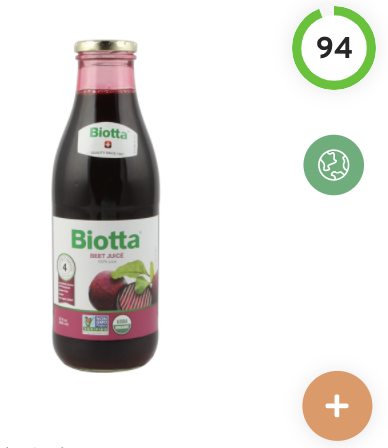
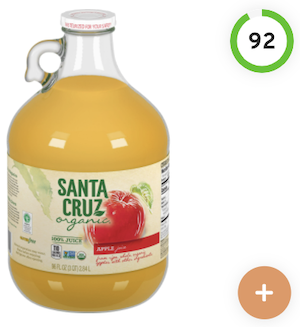
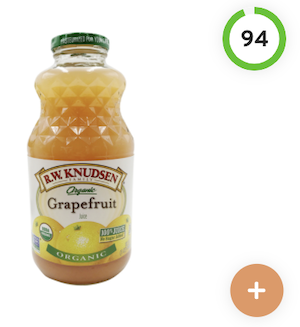
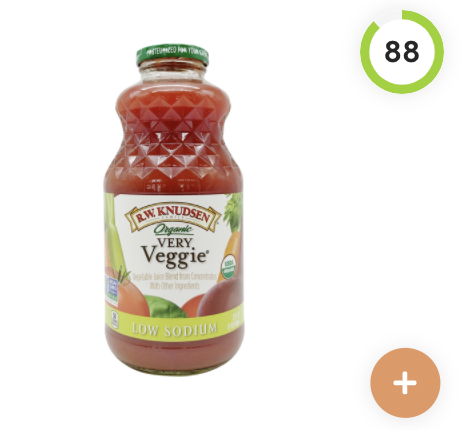
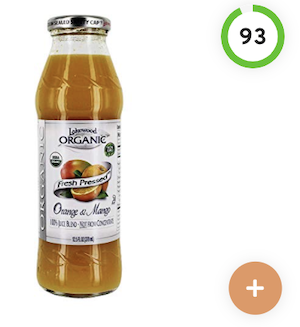
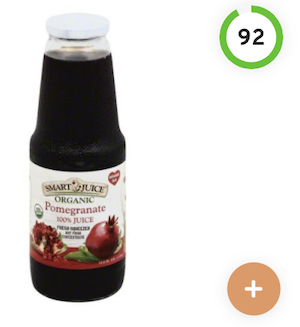
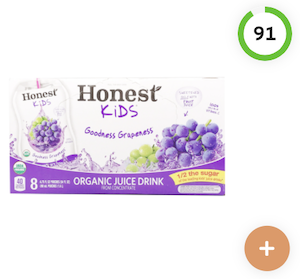
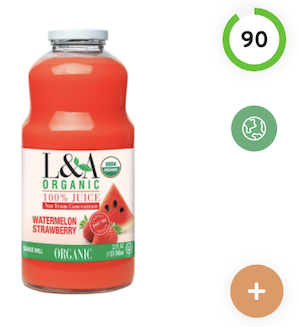
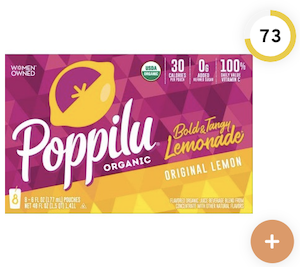


3 Comments
One major objection to juicers is that it can take longer to clean them than it can to produce a quart or two of juice.
Surprising and confusing newsletter… So, you title your newsletter “ultimate guide to hidden sugar” and then you recommend bottled juices..???? I’m confused here, organic or not, a press fruit juice is full of sugar and much less interesting than a real, entire fresh fruit in term of nutrition… This make me think I can’t really trust your articles and rely on the information you provide…
Hi Marion,
GreenChoices Principal Dietitian here! This is a great observation, thank you for your comment. It’s a perfect opportunity to point out the difference between added sugar — which we discuss in our article “Sugar in Food: The Ultimate Guide” — and naturally occurring sugars.
Added sugars are forms of sugar that are introduced to food and beverage products during processing. Added sugars supply “empty calories,” meaning provide plenty of energy but offer no other nutrients (vitamins, minerals, etc). Naturally occurring sugars are found in foods like fruit and milk.
While too much of any type of sugar — even those naturally occurring in juice — is not beneficial for the body, 100% fruit juice in moderation supplies beneficial plant compounds, vitamins and minerals. Several studies point to potential health benefits of drinking juice in moderation, which we highlight in the section “Benefits of drinking organic juice.” You are exactly right that an entire fresh fruit would be much more beneficial nutritionally speaking than juice, especially due to the fiber content in fresh fruit. For more info on this, we’ve highlighted these concerns in the section “Downsides of organic juice.”
Hope this helps clear up any confusion!
Makayla Meixner, MS, RDN